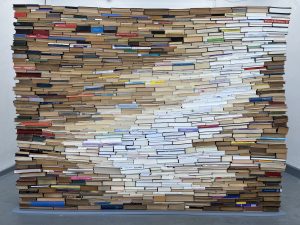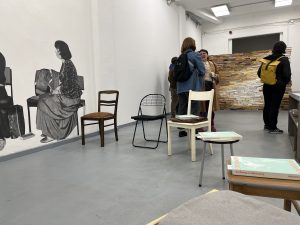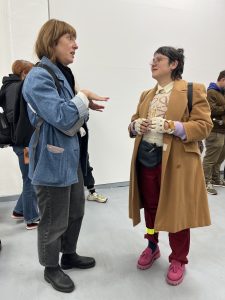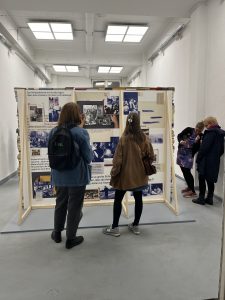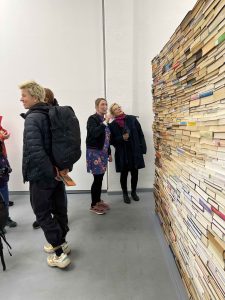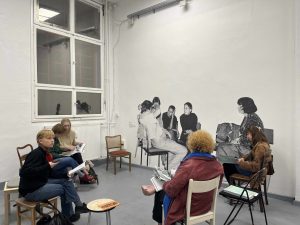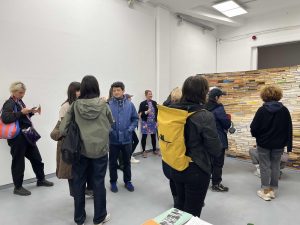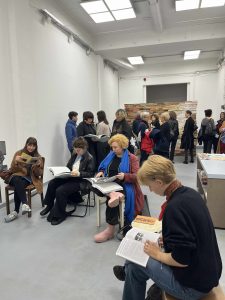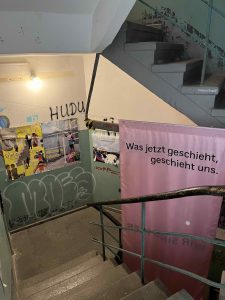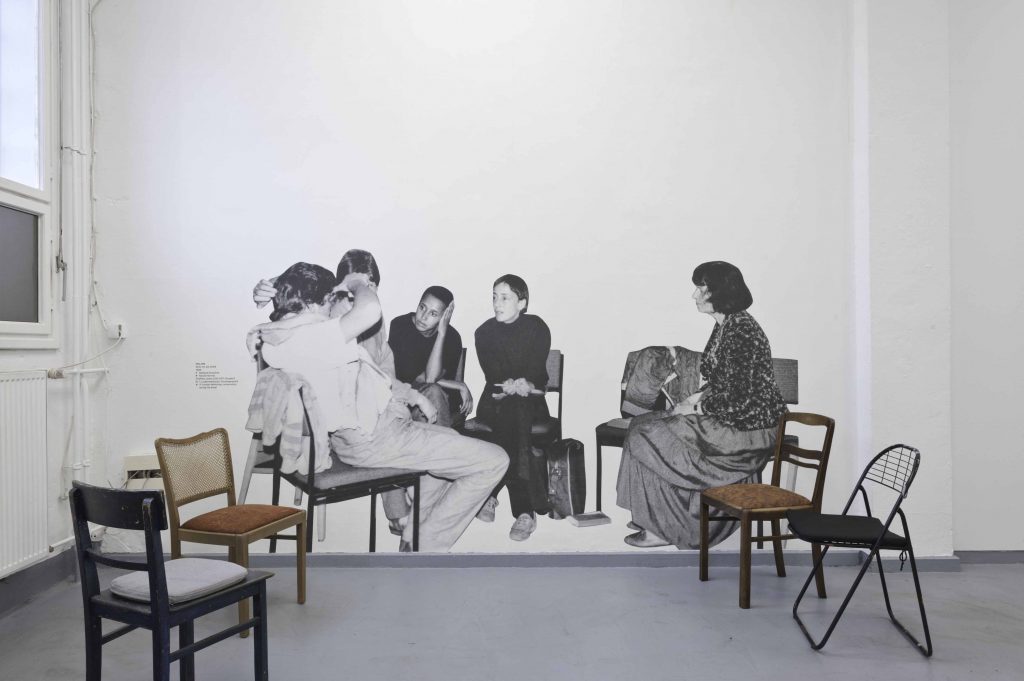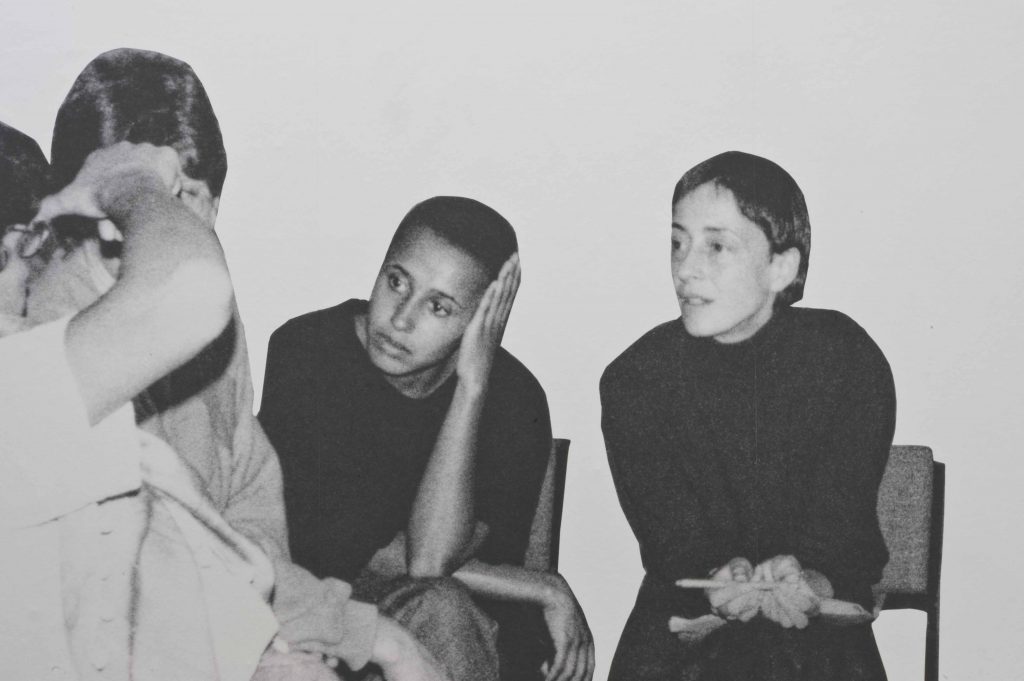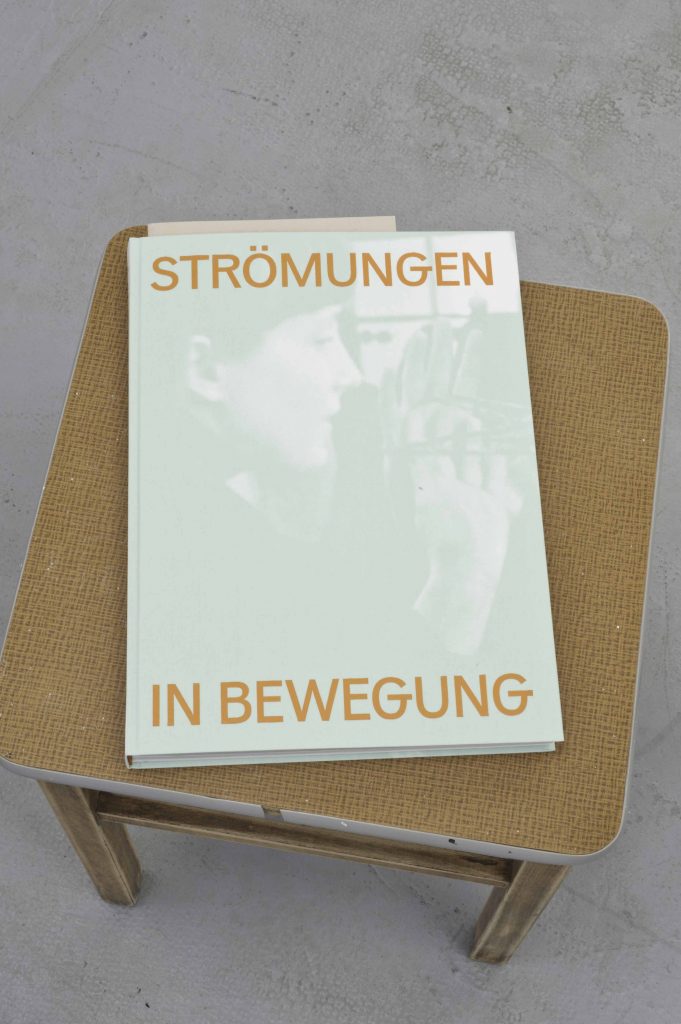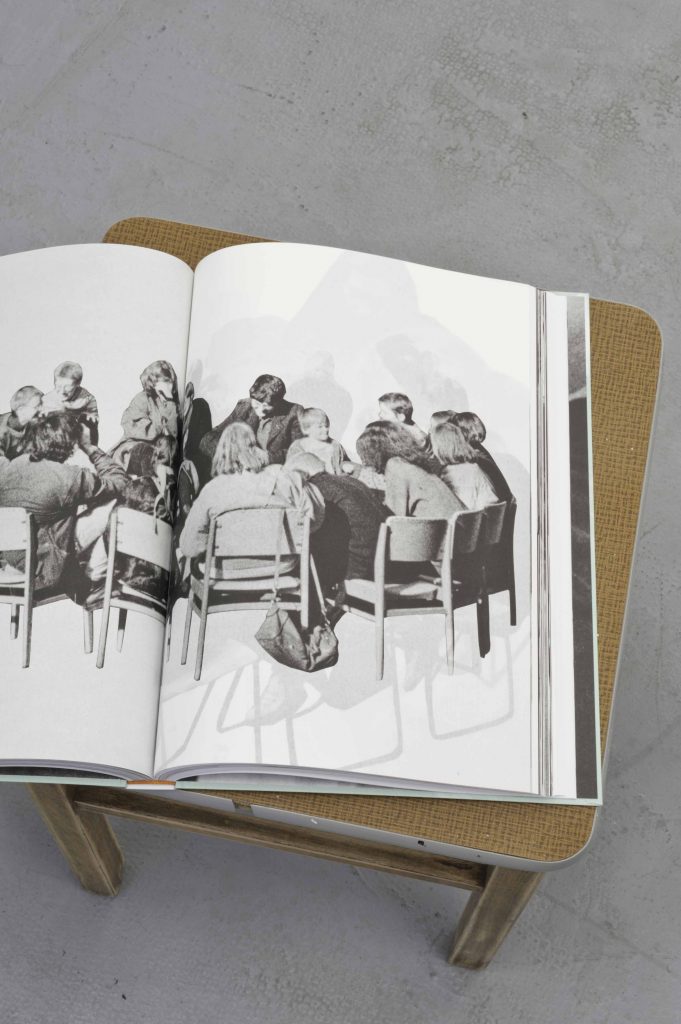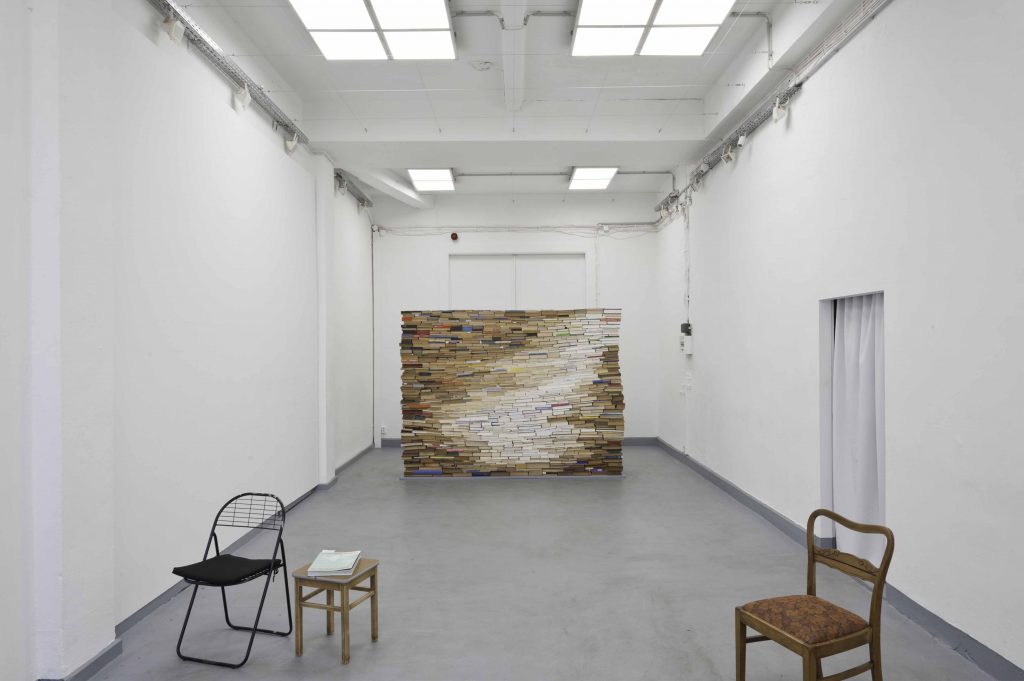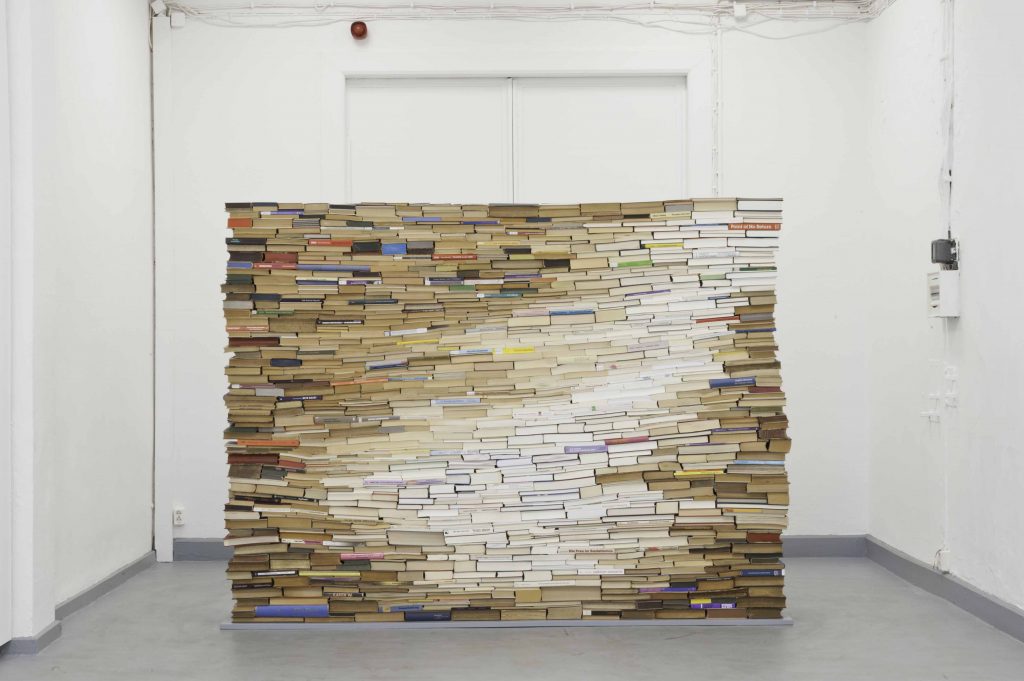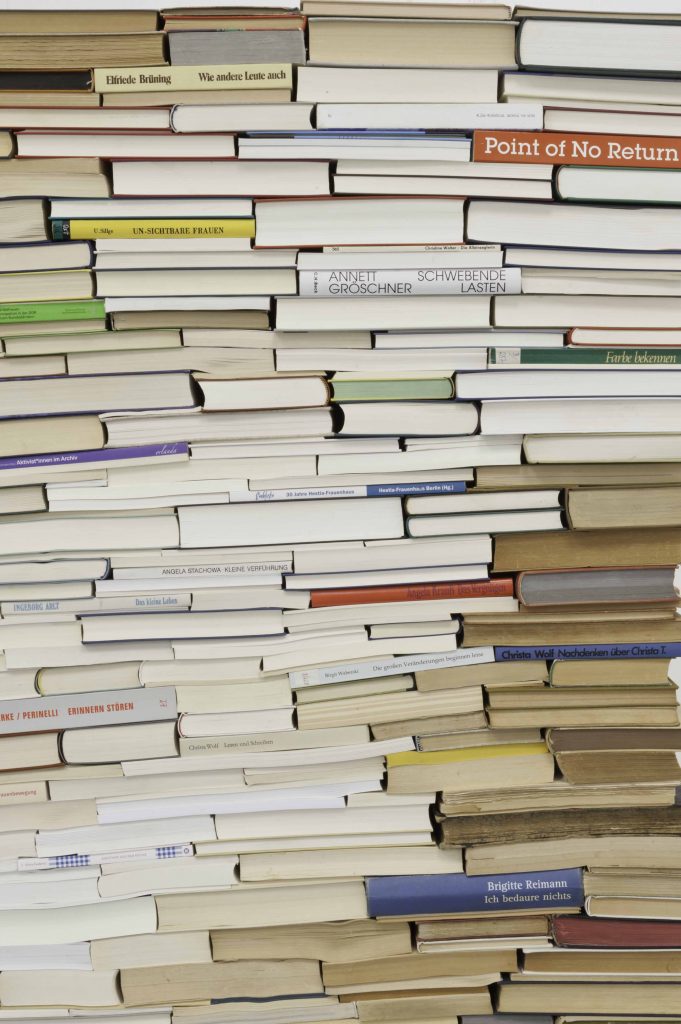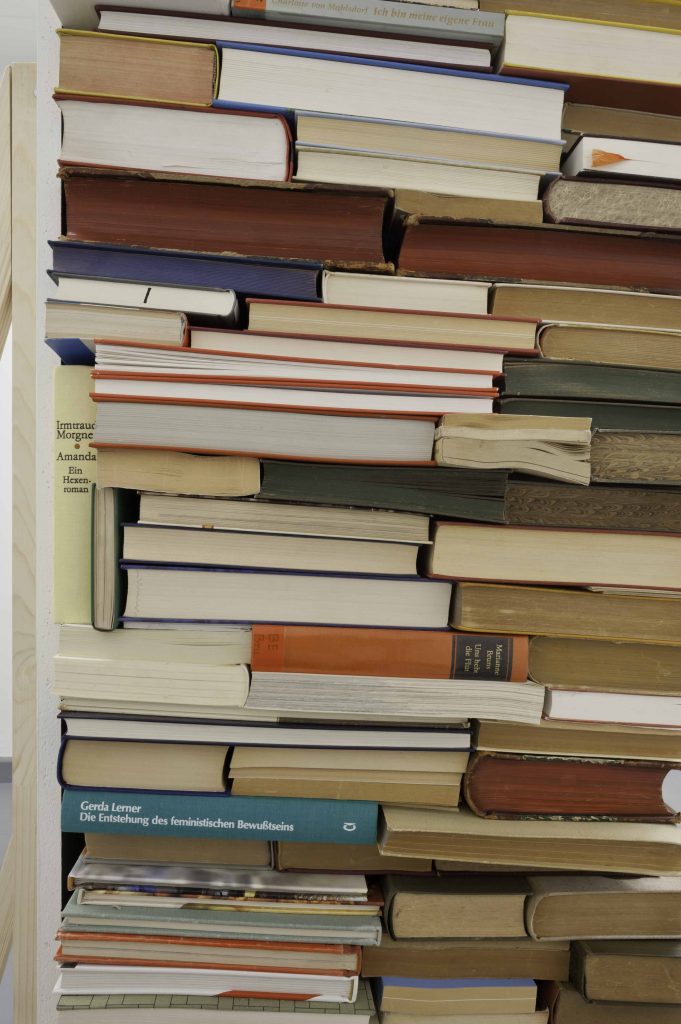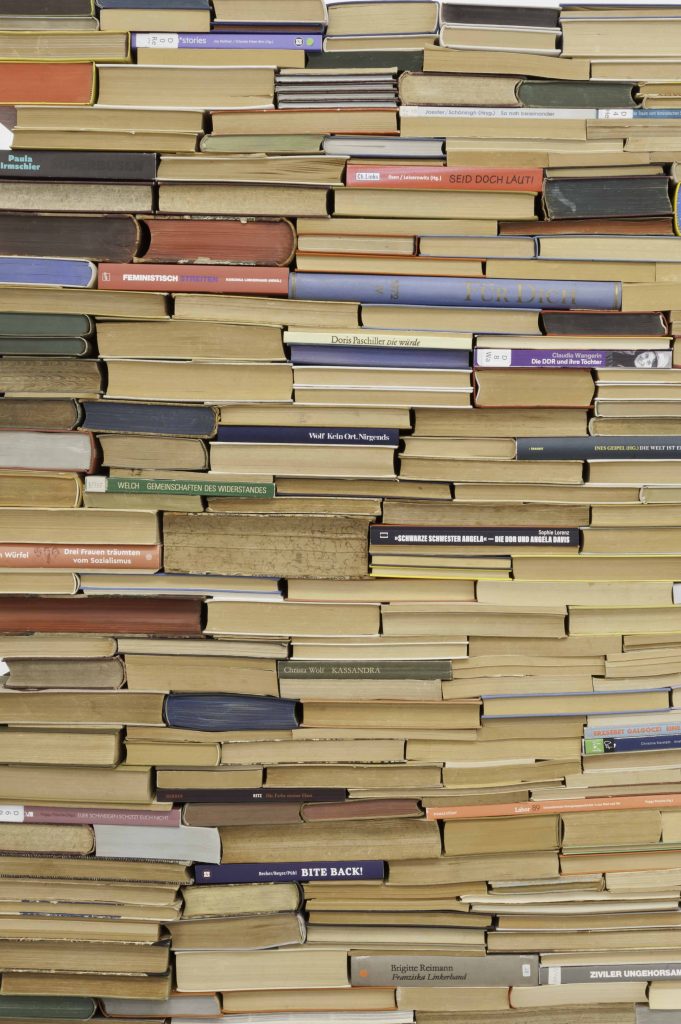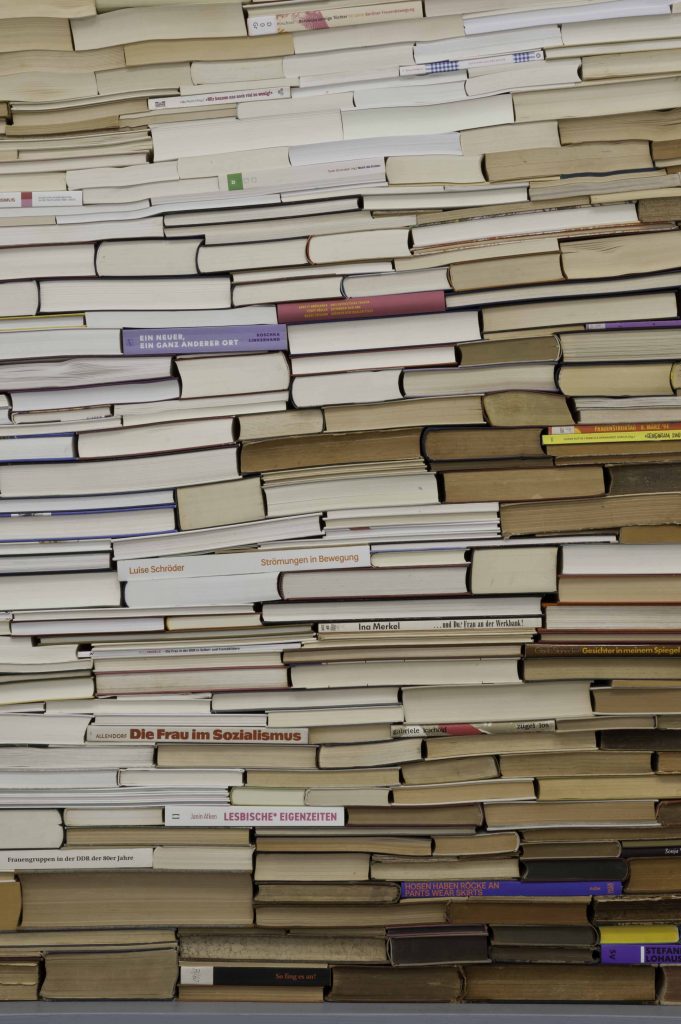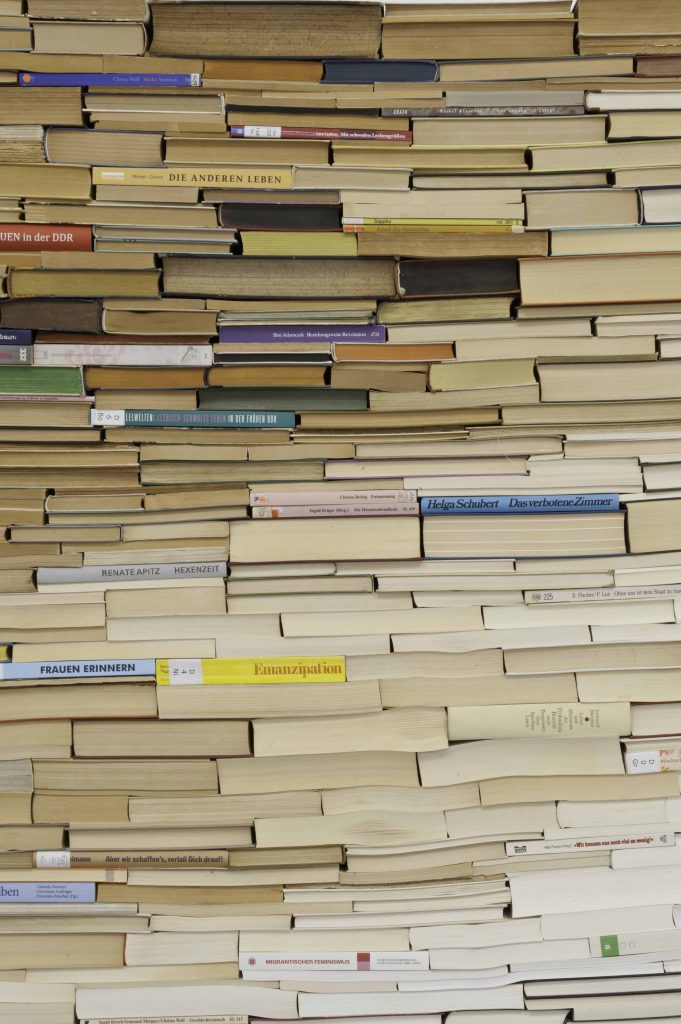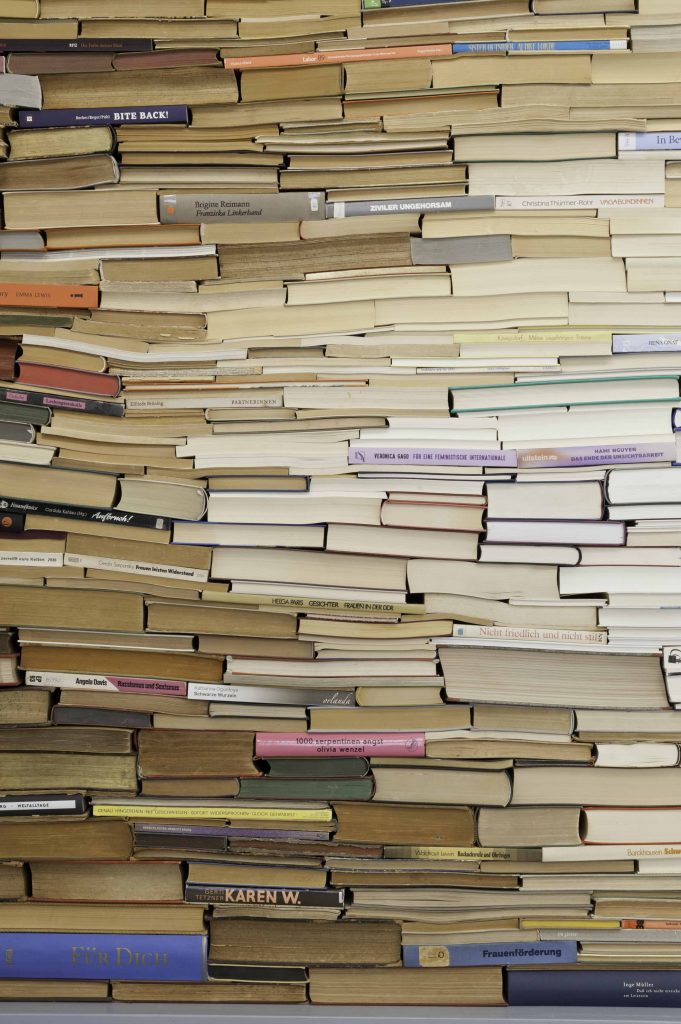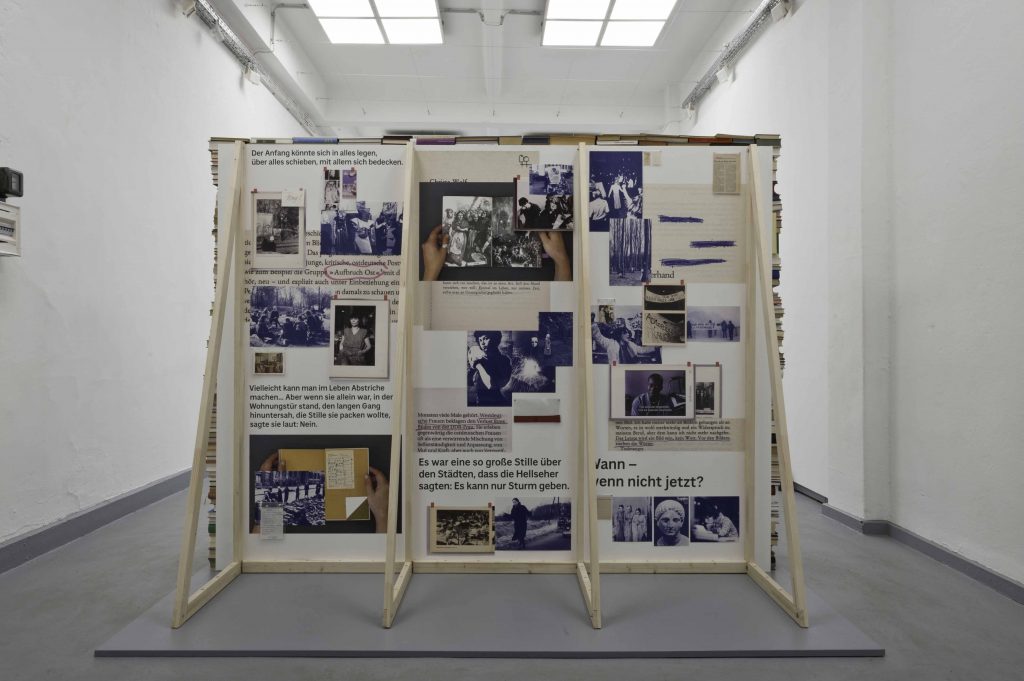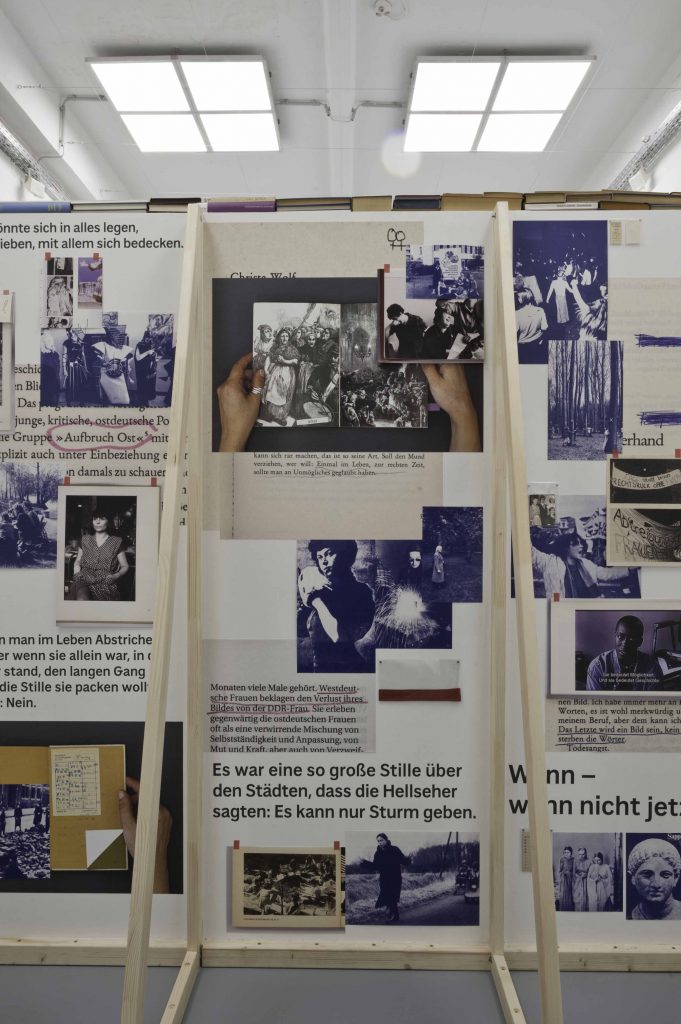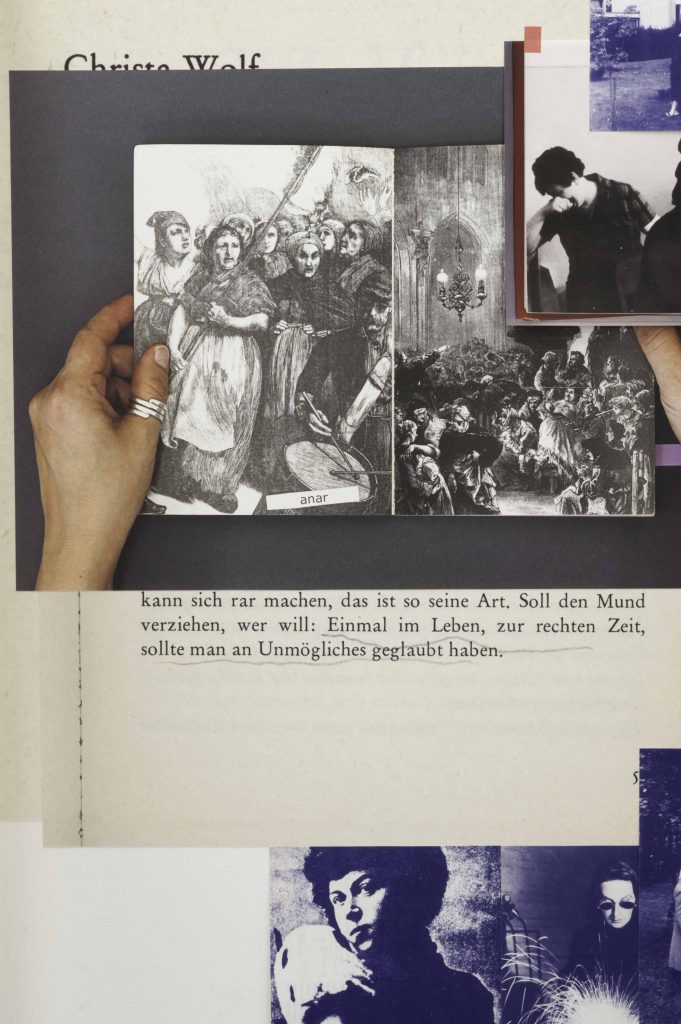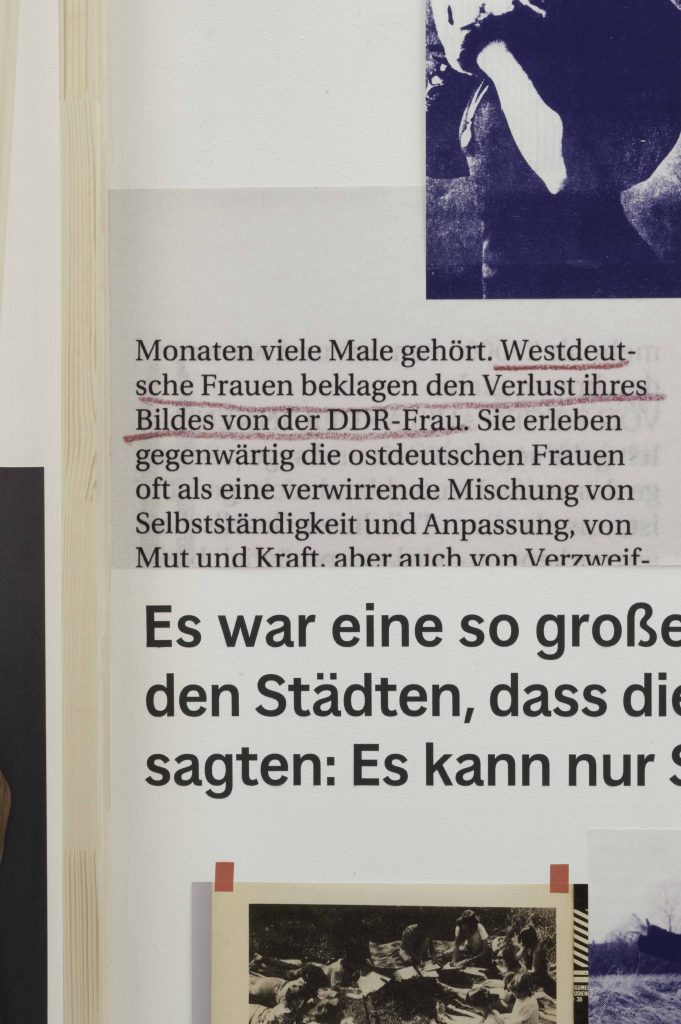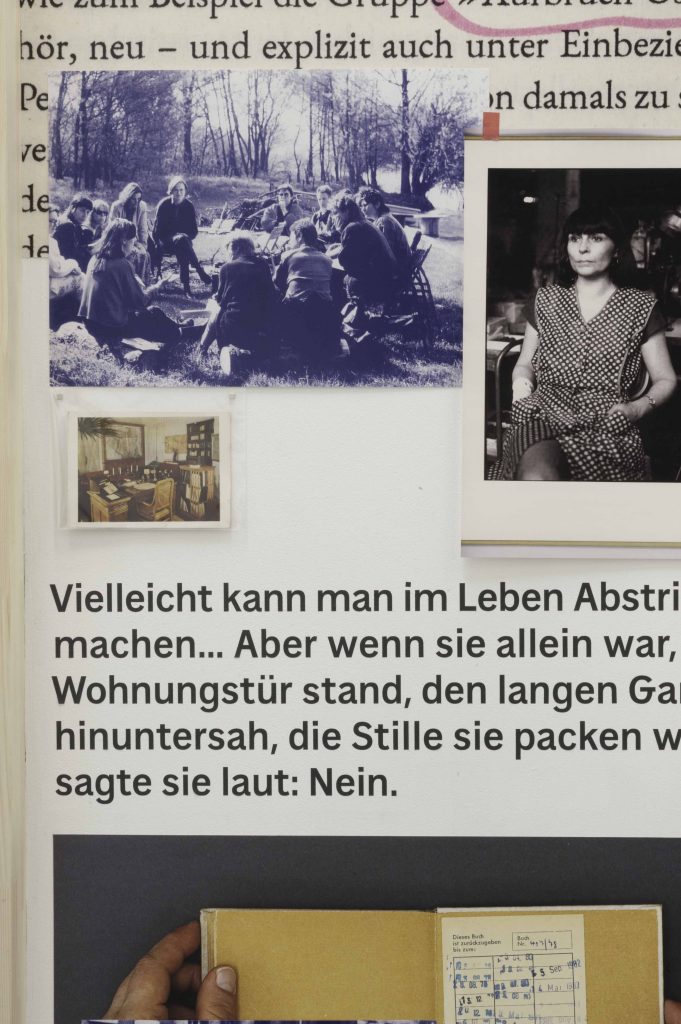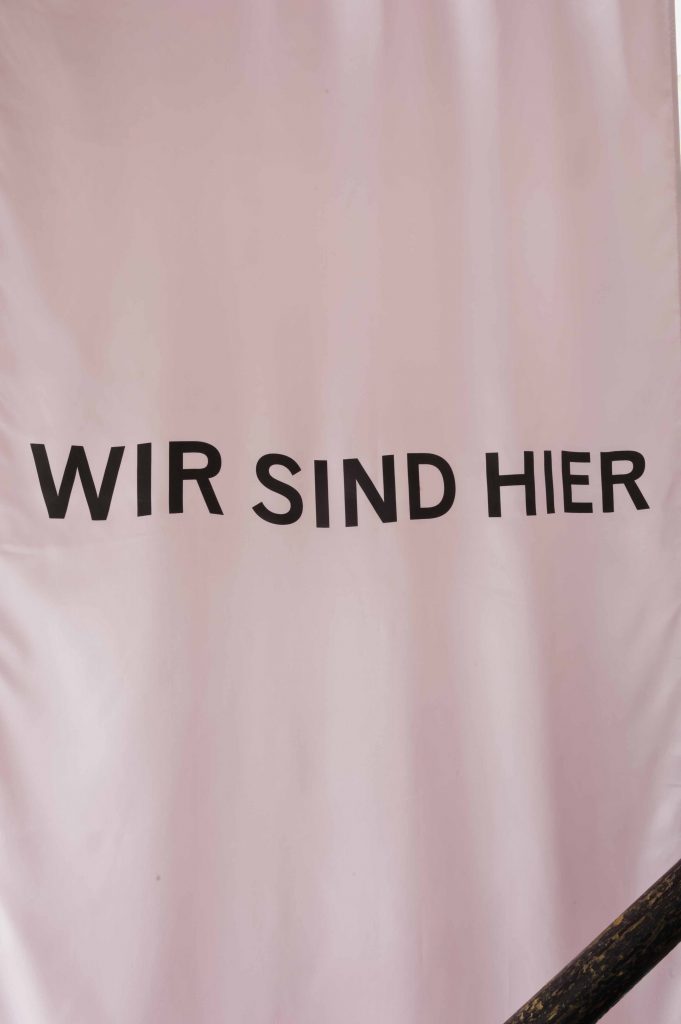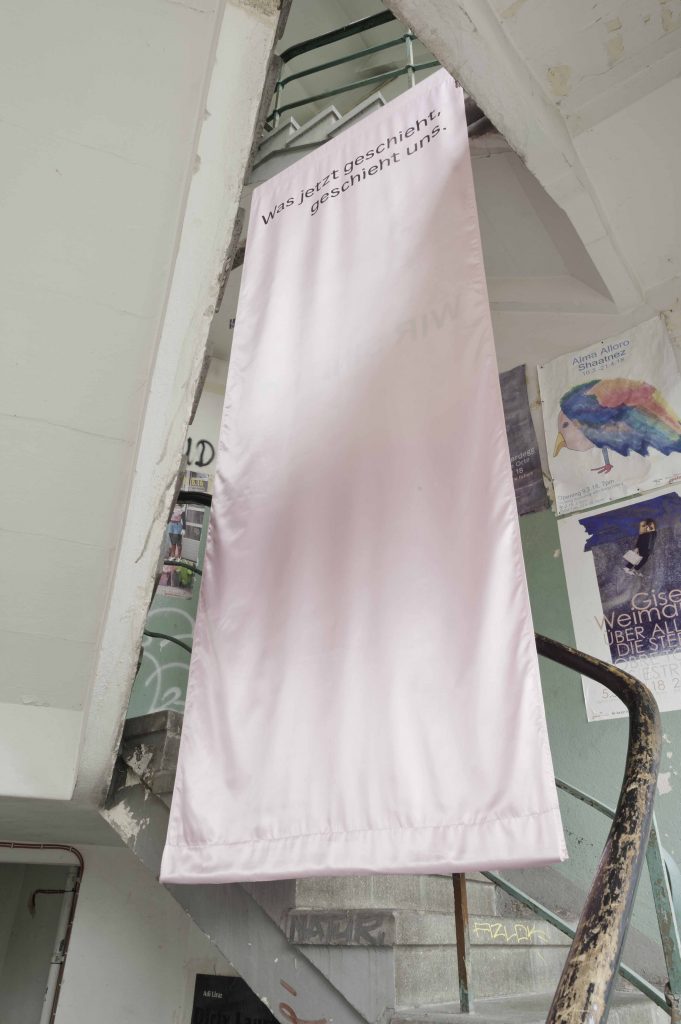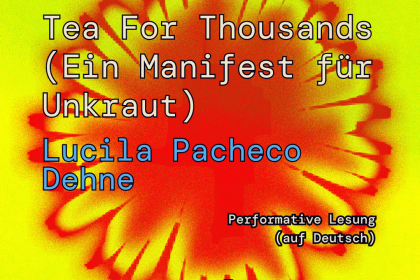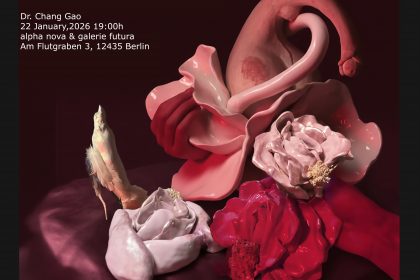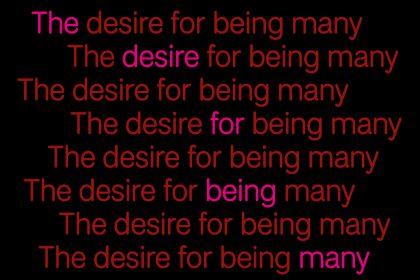Luise Schröder: Die Antwort lautet: NEIN
27.9.-15.11.2025 // Wed-Sat 16:00-19:00
Opening 26.9.2025 // 19:00
With her research and exhibition project Die Antwort lautet: NEIN [The answer is: NO], Luise Schröder explores the hitherto little-studied history of the independent women’s and lesbian movement in the GDR. The exhibition takes as its starting point the feminist literature of the period, which highlighted social contradictions, created female characters who were conscious of their physicality and autonomy, and critically questioned existing gender relations.
Individual and collective memory, the reappraisal and reception of history and stories are placed in relation to contemporary queer-feminist knowledge production and examined for their socio-political and utopian content.
The central element of the exhibition is a ‘book barricade’ made up of feminist GDR and contemporary literature. The installation recalls barricades as symbols of resistance and brings together books and voices from different generations in a multi-layered collective dialogue that in turn highlights gaps in the present and the past.
The accompanying and expanded supporting programme of intergenerational discussions, readings, a film presentation and a workshop-based archive visit creates opportunities for joint learning, remembering and reflection.
Die Antwort lautet: NEIN is an artistic exploration of suppressed stories of female and lesbian resistance in the GDR and an invitation to learn from these experiences: about forms of solidarity, self-empowerment and utopias that are taking on new urgency today, in times of increasing anti-feminist backlash.
Luise Schröder is a visual artist working with photography, video, installation, performance and printed matter. She deals with the notions of history and memory, and with their respective significance for the present. Her works are always based on an extensive theoretical and practical research, which opens up poetic spaces for reflection, alternative contexts of knowledge and new perspectives on history within the present. Luise Schröder’s works were presented internationally in various solo and group exhibitions and screenings, including Rencontres Internationales Paris/Berlin; Centre Pompidou, Paris; BIENALSUR —International Biennial of Contemporary Art of the South, Córdoba & Montevideo; 7th Berlin Biennale for Contemporary Art, Berlin; and Galerie EIGEN+ART, Leipzig/Berlin. Schröder was an artist-in-residence at Villa Aurora in Los Angeles and at the Cité internationale des arts in Paris. She is a member of the women artists’ collective The Crown Letter and currently a fellow at the Berlin Artistic Research Program 2024/25.
www.luiseschroeder.org
PROGRAM
Ich nehme mir die Widerspenstigkeit zur Hand – Book Presentation (in German)
3.10. 2025 // 19:00
Where: Sonntagsclub e.V., Greifenhagener Str. 28, 10437 Berlin (FLINTA* only)
Luise Schröder presents her artist’s book Strömungen in Bewegung [Currents in Motion] (Fotohof Editions 2025) with photos of the independent women’s and lesbian movement in the GDR. More information about the book here.
An event as part of L*OST 2025 – Lesbian Life and Struggles in the GDR; in cooperation with Berliner Programm Künstlerische Forschung, Sonntagsclub Berlin, alpha nova & galerie futura, Spinnboden Lesbian Archive and Library.
Am 1. Mai packte ich meine Zahnbürste ein und ging auf die Demo – Discussion (in German)
9.10.25 // 19:00
Intergenerational discussion with contemporary witnesses on forms of political, artistic, literary, and cinematic activism and practices of dissent in the GDR and today with Samirah Kenawi, Angelika Nguyen, Judith Geffert, Luise Schröder, moderated by Suza Husse
Judith Geffert, born in Magdeburg in 1989, is a freelance radio writer. They studied literature and theatre studies, as well as culture and history of Central and Eastern Europe in Berlin and Frankfurt (Oder). Since 2013, they have been producing features, storytelling podcasts and experimental documentaries for Deutschlandfunk, Deutschlandfunk Kultur, rbbkultur, MDR and independent radio stations. The are also co-curator of the travelling exhibition ‘Together we are unbearable. The independent women’s movement in the GDR’, which opened in 2023.
Angelika Nguyen, born and raised in the GDR, studied film studies in Babelsberg, made the documentary “Bruderland ist abgebrannt” in 1991 about the situation of Vietnamese people in East Berlin, wrote the essay “Mutter, wie weit ist Vietnam?” (Mother, How Far is Vietnam?) in 2011 about racism in her childhood, the article “Doppelt heimatlos?” about being East German and a migrant in 2018, and the autobiographical text “Das Foto” für Neue Rundschau for S. Fischer in 2024. She is a curator and film journalist and lives in Berlin.
Samirah Kenawi, born in East Berlin in 1962. Apprenticeship as a carpenter, later studied at the Technical University of Dresden. Subsequently research assistant at the Forestry Institute in Eberswalde. In the 1980s, she was active in various unofficial women’s groups. In autumn 1989, she co-founded the group ‘Lila Offensive’ and the Independent Women’s Association (UFV). In 1990, she became head of the Berlin office of the UFV. She established the ‘GrauZone’ archive of the GDR women’s and lesbian movement. In 1995, she published the documentation ‘Women’s Groups in the GDR in the 1980s’. The ‘GrauZone’ collection is now part of the archives of the Robert Havemann Society.
Suza Husse is a cultural worker, researcher-poet and swimmer. They work with a focus on visual and performative cultures of memory, speculation and re/imagination as well as collaborative processes, co-learning, and transdisciplinary research across different fields of knowledge and practice. Since 2012, Husse has been co-shaping the arts and community space district * school without center in Berlin. They co-run D’EST, a nomadic platform and online archive for postsocialist video art, and co-initiated the collective artistic research project wild recuperations. material from below, on intersectional approaches to dissident politics, ecologies, and sexualities that emerged in state socialism (Archive Books, 2020). From 2017 to 2018, they held a guest professorship for interdisciplinary artistic research at the University of Arts, Berlin. Currently, Husse coordinates the arts, community and research platform Sensing Peat for swamp and waterland ecologies and cultures at the Michael Succow Foundation and is part of the organizing committee of the Venice Agreement for Peatlands.
Im Stillen laut – Film Screening
11.10.25 // 18:30
Film evening and discussion with filmmaker Therese Koppe and protagonists Erika Stürmer-Alex and Christine Müller-Stosch (in German)
Erika and Tine are both 81 and have been a couple for over 40 years. They live and work together at the Kunsthof Lietzen art farm in Brandenburg – and look back on an eventful shared history. Director Therese Koppe accompanied the artists for over a year and deliberately focuses on their subjective experiences in her film. ‘Im Stillen laut’ (DE 2019, 74 min.) explores Erika and Tine’s strategies as artists for coping with everyday life under an authoritarian regime and how they dealt with the life-changing reunification. Contradictions, visions and memories condense into a more complex picture of East German experiences. A picture that cannot be fitted into the usual narratives of resistance or propaganda, but, like Erika and Tine, remains rebellious. A film about love in old age and autonomy, about art and collectivity in the free spaces created in the GDR, which does not stop at the past, but looks to the future with its protagonists: What can art achieve in socio-politically challenging times? How can one remain true to art and one’s ideals? What meaning can art create for the greater good and for each of us individually?
Therese Koppe (born in East Berlin in 1985) is a filmmaker and film educator. Since 2021, she has been working for the selection committee of the Duisburg Film Week. Therese is a member of the queer-feminist film group Lust&Krise. Together with Esther Niemeier, she founded the production company TILDA FILMS. In her filmmaking practice, she works with participatory and collaborative approaches, most recently in the project DURCH UNSERE AUGEN (2023/24) in cooperation with Wafaa Khattab (Mehringplatz neighbourhood management), Theater Hebbel am Ufer and the Central State Library. In 2023/24, Therese headed the programme for the additional qualification in film education at Filmhaus Köln. Since 2025, Therese has been a member of Lichtspiel — Netzwerk für kulturelle Filmbildung (Network for Cultural Film Education). In 2025/26, Therese will take over as project manager for the European film education project cinemini at the German Film Academy Berlin.
Christine Müller-Stosch, born in Haynau, Silesia, in 1938, dismissed from the education system of the GDR in 1952. 1954–1956: grammar school in (West) Berlin-Reinickendorf. 1956–1959: ecclesiastical proseminar in Naumburg/Saale. Studied theology at the Church University in Naumburg/Saale and at the Sprachenkonvikt Berlin-Mitte from 1959 to 1965. Worked as an editor at the Evangelische Verlagsanstalt Berlin (central publishing house of the Protestant churches in the GDR) from 1965 to 1991. Since 1973 Participant in the painting and graphic arts course led by Erika Stürmer-Alex. 1992-1995 Project and course leader in the ‘Kreativ leben lernen’ (Learning to Live Creatively) project at Kunsthof Lietzen. Until 2016 Responsible for organising guest groups at Kunsthof Lietzen.
Erika Stürmer-Alex, born in Wriezen in 1938, studied painting, graphic design and art in architecture at the Berlin-Weißensee School of Art from 1958 to 1963. In 1982, she moved to Lietzen, where she purchased a farmstead and has been teaching courses in painting, graphic design and collage every year since 1983. In 2015, she received the Brandenburg Minister President’s Honorary Award for her life’s work. Exhibitions include the Brandenburg State Museum of Modern Art in Cottbus, the Albertinum in Dresden and the Museum Barberini in Potsdam. Works by Erika Stürmer-Alex are in the collections of the National Gallery (Berlin), the Museum Junge Kunst Frankfurt (Oder), the Brandenburg Art Collections Cottbus, the Dresden State Art Collections, the University Gallery Evansville (Indiana), USA, and in many private collections.
Schreiben heißt Schreien – Reading circle and reading club: Discover feminist GDR literature (in German)
23.10.25 // 19:00
Joint reading of feminist GDR literature with Alexandra Ivanova (MONAliesA – Feminist Library and Archive Leipzig) and Franziska Haug (University of Regensburg)
We invite you to join us in delving into feminist GDR literature and reading and discussing excerpts from Maxie Wander’s Guten Morgen, du Schöne [Good Morning, Beautiful One] (1977) and Irmtraud Morgner’s Leben und Abenteuer der Trobadora Beatriz nach Zeugnissen ihrer Spielfrau Laura [The Life and Adventures of Trobadora Beatriz According to the Testimony of her Playmate Laura] (1974). What do these texts tell us today? What reading experience can we gain from them? How can they help us explore GDR literature from a feminist perspective and understand facets of society? Questions, irritations and surprising discoveries in and with text passages will guide our session. What we discuss can then be recorded in a small reading diary in zine format.
Franziska Haug was born and raised in Cottbus in 1989. She studied art education, sociology and German language and literature at Goethe University Frankfurt am Main, where she earned her doctorate with a thesis on work as a literary method of gender production in the works of Thomas Brasch, Gisela Elsner, Elfriede Jelinek, Ronald M. Schernikau and pop music (Verbrecher Verlag 2025). She is currently conducting postdoctoral research in the Light On! Queer Literatures and Cultures under Socialism. Franziska is a founding member of the DiasporaOst collective, which seeks aesthetic and political narratives to understand growing up in East Germany during the upheaval of 1989/1990, the legacy of GDR socialisation and life in the diaspora of the FRG.
Alexandra Ivanova is a sociologist, freelance author and translator for the Russian language. Since February 2017, she has been running the reading club at the feminist library MONAliesA in Leipzig, where literature by women from the GDR is read. She has taught courses on ‘Women’s Writing’ in the GDR and published essays on feminist literary topics in various magazines, including outside the box – Zeitschrift für feministische Gesellschaftskritik [Journal for Feminist Social Criticism] and PS: Anmerkungen zum Literaturbetrieb / Politisch Schreiben [PS: Notes on the Literary Scene / Political Writing].
Raus aus den Archiven! – Workshop (in German)
31.10.25 // 10:30 -16:00 (included: guided tour + lunch break)
Participants: 8-10; Registration via: mail@galeriefutura.de
Workshop and joint visit to the Archive of the GDR Opposition/GrauZone (Robert Havemann Society) by and with Elske Rosenfeld
How is the past present in the present? Which stories are told and which remain invisible?
What is archived, how, and by whom? How can archives become the starting point and subject of artistic and research-based engagement with the present?
During the visit and workshop on site, Elske Rosenfeld will provide insight into her artistic and research-based practice in relation to the archive of the GDR opposition.
Elske Rosenfeld (*1974 in Halle/S.) is an artist, author and cultural worker researching the history of dissidence in Eastern Europe and the events of 1989/90. Based on historical documents and archives, she creates contexts and constellations in which this history/these histories can become present. In her current artistic research project ‘A Vocabulary of Revolutionary Gestures’, she examines the body as a venue and archive of political events. Since 2022, this long-term project has taken the form of the research and exhibition platform Archive of Gestures.


